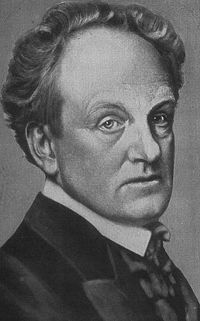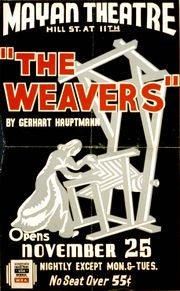Gerhart Hauptmann
| Gerhard Hauptmann | |
|---|---|
 |
|
| Born | 15 November 1862 Obersalzbrunn, Silesia, Prussia |
| Died | 6 June 1946 (aged 83) Agnetendorf (Jagniątków), People's Republic of Poland |
| Occupation | dramatist |
| Nationality | German |
| Literary movement | Naturalism |
| Notable work(s) | The Weavers, Die Ratten |
| Notable award(s) | Nobel Prize in Literature 1912 |
Gerhart Hauptmann (15 November 1862—6 June 1946) was a German dramatist who received the Nobel Prize in Literature in 1912.
Contents |
Hauptmann's career as a playwright
Hauptmann was born in Obersalzbrunn, a small town of Silesia, now known as Szczawno-Zdrój and a part of Poland.
He was the son of a hotel-keeper. From the village school of his native place he passed to the Realschule in Breslau, and was then sent to learn agriculture on his uncle's farm at Jauer. Having, however, no taste for country life, he soon returned to Breslau and entered the art school, intending to become a sculptor. Here he met his life-long friend Josef Block. He then studied at Jena, and spent the greater part of the years 1883 and 1884 in Italy. In May 1885, Hauptmann married and settled in Berlin, and, devoting himself entirely to literary work, soon attained a great reputation as one of the chief representatives of the modern drama.
In 1891 he moved to Schreiberhau in Silesia. Hauptmann's first drama, Vor Sonnenaufgang (1889) inaugurated the naturalistic movement in modern German literature. It was followed by Das Friedensfest (1890), Einsame Menschen (1891) and Die Weber (The Weavers 1892), a powerful drama depicting the rising of the Silesian weavers in 1844. Of Hauptmann's subsequent work, mention may be made of the comedies Kollege Crampton (1892), Der Biberpelz (1893) and Der rote Hahn (1901), the symbolist dream play The Assumption of Hannele (1893), and an historical drama Florian Geyer (1895). He also wrote two tragedies of Silesian peasant life, Fuhrmann Henschel (1898) and Rose Bernd (1903), and the dramatic fairy-tales Die versunkene Glocke (1897) and Und Pippa tanzt (1905).
Hauptmann's marital life was difficult, and in 1904 he divorced his wife. That same year he married the actress Margarete Marschalk, who had borne him a son four years previously. The next year, his second marriage was interrupted by an affair with the 17-year-old Austrian actress Ida Orloff, whom he met in Berlin when she performed in his play The Assumption of Hannele. Orloff inspired characters in several of Hauptmann's works, and he later referred to her as his muse.
In 1911 he wrote Die Ratten. In 1912, Hauptmann was awarded the Nobel Prize in Literature, "primarily in recognition of his fruitful, varied and outstanding production in the realm of dramatic art."
During the First World War Hauptmann was a pacifist. In this period of his career he wrote several gloomy and historical-allegorical plays, like Der Bogen des Odysseus (1914), Der weisse Heiland (1912–17), Winterballade (1917). After the War, his ability was clearly on the wane. There are two full-length plays which are similar to the early successes, but with a little Realistic taste: Dorothea Angermann (1926) and Vor Sonnenuntergang (1932). He remained in Germany after Hitler's Machtergreifung and survived the fire storm of Dresden. His last bow is the Atriden-Tetralogie (1942–46).
Several of his works have been translated into English. These include the plays which he wrote till Veland (1925), except Elga, an earlier fairy play and Festspiel in deutschem Reimen, a festival play. His works were published by S. Fischer Verlag.
Hauptmann died at the age of 83 at his home in Agnetendorf (now Jagniątków, Poland) in 1946. As Polish communist administration did not allow Hauptmann's relatives to bury him in Agnetendorf although even the Soviet military government recommended it, his body was transported in an old cattle wagon to occupied Germany more than a month after his death. He was buried near his cottage on Hiddensee.
Works

(Please note that this list is incomplete)
Novels
- Der Narr in Christo Emanuel Quint (1910)
- Atlantis (1912)
- Phantom (1923)
- Wanda, der Dämon (1926)
- Die Insel der grossen Mutter (1928)
- Um Volk und Geist (1932)
- Im Wirbel der Berufung (1936)
- Der Abenteuer meiner Jugend (1937)
Short novels
- Bahnwärter Thiel (1888)
- Die Ketzer von Soana (1924)
- Marginalien (selected works, reports: 1887–1927)
- Sonnen (1938)
- Der Schuss im Park (1939)
Verse novels
- Romethidenlos (1885)
- Anna (1921)
- Die blaue Blume (1924)
- Till Eulenspiegel (1927)
- Das Meerwunder (1934)
- Der grosse Traum (1912–42)
Plays
|
|
Sources
![]() This article incorporates text from a publication now in the public domain: Chisholm, Hugh, ed (1911). Encyclopædia Britannica (Eleventh ed.). Cambridge University Press.
This article incorporates text from a publication now in the public domain: Chisholm, Hugh, ed (1911). Encyclopædia Britannica (Eleventh ed.). Cambridge University Press.
External links
|
||||||||
 This article incorporates text from a publication now in the public domain: Chisholm, Hugh, ed (1911). Encyclopædia Britannica (Eleventh ed.). Cambridge University Press.
This article incorporates text from a publication now in the public domain: Chisholm, Hugh, ed (1911). Encyclopædia Britannica (Eleventh ed.). Cambridge University Press.